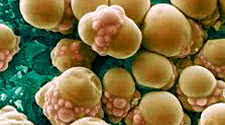Key to Success: Research Based Hormones Control Fat Cells

Understanding Fat Cells and Hormonal Functions
Thirty years ago, most scientists viewed fat cells as largely inert energy storage depots. They reasoned that people were overweight because
they consumed more calories than they expended through resting metabolism and exercise. Americans have been obsessed with weight since World
War II, yet people are much fatter today than they were in 1960. It's obvious that our diet and exercise plans are not working.
Part of the problem is that fat cells try to hold onto stored fat. Robert McMurry and Anthony Hackey from University of North Carolina discussed
fat cells and the hormones that control them. Hormones, such as epinephrine, norepinephrine, insulin, cortisol and glucagon influence hunger,
satiety (satisfaction of hunger) and metabolic rate (caloric expenditure). Fat cells release hormones of their own, including leptin and cytokines,
that also help regulate hunger and metabolism.
The control system is set up to maintain a stable weight which helps explain why it's so difficult to lose body fat and keep it off. Exercise
helps mobilize and use stored fat which explains why physical activity is so important in successful weight loss programs.